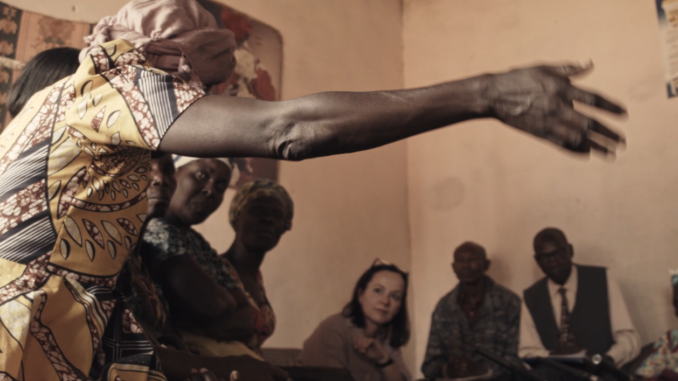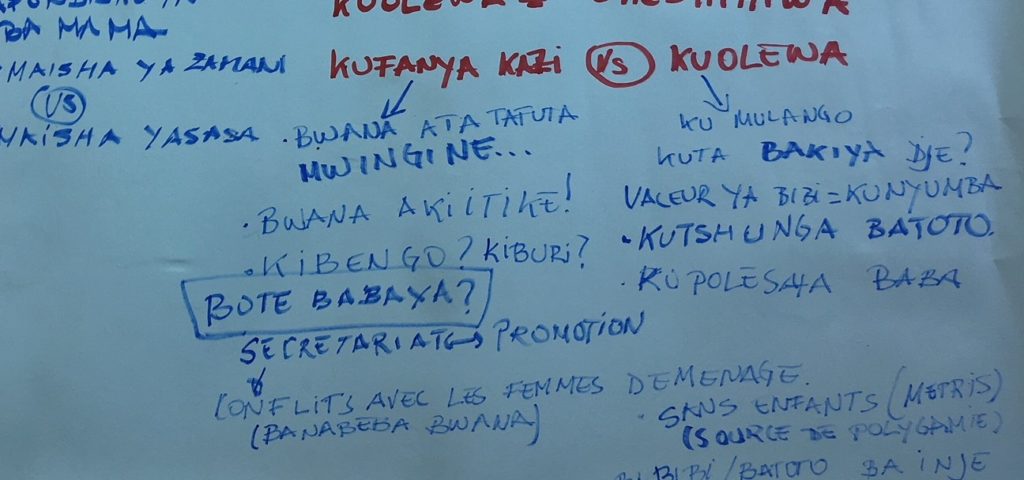
Daniela Waldburger is a Post-doctoral Researcher at the Department of African Studies, University of Vienna. Her research is part of a broader research project on Language, Agency and Governance in three Housing Projects in Thika (Kenya), Livingstone (Zambia) and in Lubumbashi (DR Congo), c. 1940s to 1970s: “Employment-tied Housing in (post)colonial Africa”.
Many researchers conduct interviews and we usually do so because we seek to understand our interviewee’s perspective on a certain topic or to gain information. While this was also the case for me the question examined here is on the choice of interview language and how that choice both reflects and affects research outcomes.
My target group are ex-mineworkers, members of the Collectif des ex-agents de la Gécamines “Départs Volontaire” (ODV) who lost their jobs in 2003 in a deal with the World Bank to save the run-down company Gécamines, the successor to Union Minière du Haut-Katanga (UMHK). The interviewees were all born between the 1930s and 1950s, started their work careers in the late 1950s to early 1970s and experienced a working life that was characterized by company control from birth to death. Gécamines controlled schooling, provided housing, and managed housing and leisure activities for workers and their families. However, after a sustained severe economic decline in the Democratic Republic of Congo from the 1990s, the workers lost their jobs. Thus the ex-mineworkers tell narratives of this work life that are characterized by an immense nostalgia of an ”object of loss“ (Worby/Allen 2013: 468.. « C’était bien à l’époque ! » (It was good at that time!) was the most commonly expression used by my interviewees to talk about the period before 2003. This “object of loss” is a product of imagination and memory.
In the context of these interviews, it became clear that the language policies of the colonial state, UMHK and its successor Gécamines left long-term imprints that have affected the status attributed to Swahili and French up until today. The entanglement of Swahili and French with the colonial heritage and the status assigned to Swahili and French at that time play an important role in ex-mineworkers‘ current attempts to create stability in a future they judge to be sombre. Swahili, the lingua franca among workers, was also the language that connected the mine company with its workers. Hence, the schools provided for the workers’ children – envisaged as the company’s future workforce – and prioritised Swahili from the moment of enrolment. UMHK believed it was vital to start teaching in Swahili so that it would be the general language throughout Haut Katanga. However, knowledge of at least basic French was equally promoted among the children of blue-collar workers. For the company’s future managers and senior workers, French was vital and thus was taught and regarded as the language of prestige and power.
As a result of this history, the language choice of the ex-workers and myself during my interviews not only reflects what is thought to be the most appropriate means of communication, but also the relations of power between those who write or speak and those who listen or read. Those involved in communication choose a language to pursue resistance or offer concession.

Swahili is today the lingua franca among the members of the ODV. However, in their communication with the Collectif president, French was more common, even though the president is a Swahili speaker. In terms of language use, this resulted in highly formalized openings to the association’s meetings in French, followed by a prayer in Swahili. The discussions afterwards that I attended were characterized by a constant switching between Swahili and French, in which the Swahili in use in Lubumbashi borrows many words from French and vice versa. Whenever I was invited to talk during these meetings to present my research project, make interview requests or any other issue, I had to follow the protocol given by the president in French. I thus addressed the Collectif in French, but soon switched to Swahili because the president or his secretary had to translate French into Swahili for some members. Workers’ knowledge of French depends largely on the category of work they did. Blue-collar workers usually had less formal education and thus less knowledge of French, while those whose career paths ended in senior positions needed a very good command of French, not least because all the paper work was in French. However, since both manual and clerical positions were themselves broken down into numerous sub-divisions, there is a broad spectrum of competence in Swahili and French. I thus adapted to the convention that French was the appropriate choice in a formal setting, while recognising that Swahili was equally important when it came to the actual content and transmission of information. The Collectif secretary showed me his meticulous minutes of these meetings since 2003. It should be no surprise that all the minutes are in French, the language that – even after independence – has dominated writing in Lubumbashi. This is not because French is more widespread, but because of the lack of standardisation in the Swahili variety used in Lubumbashi. In addition however, the higher status of French gives minutes in that language a greater relevance, not least because of their role in documenting the ex-workers’ fight for compensation, a highly important matter.
I usually asked my interviewees about their language preference. In the Cité Gécamines, where most ex-blue-collar workers live, most were in favour of Swahili, while in Makomeno, the neighbourhood of ex-senior workers, French was usually preferred. In the course of the interviews, however, both languages were used. One interview was only in French, although all communication with the interviewee before and after was in Swahili, with no French loan words. This particular interview took place in Makomeno in the house of a former manager, who had moved with his wife to Lubumbashi from Bukavu, a city in the very east of the DR Congo on the border with Rwanda. In Bukavu, the Swahili spoken is more similar to that of the African East Coast and thus closer to the variety I learned. From the first moment I met him and his family, our communication was only in Swahili, and they even expressed their delight to speak “their” Swahili. However, for the recorded interview, he insisted on French. As an ex-manager, he explained, he wanted to perform according to what is formally required. Thus, the language choice is never solely a pragmatic choice to ensure mutual understanding, but equally one that reflects the status linked to its usage and performance.
References
Eric Worby and Shireen Ally. 2013. The disappointment of nostalgia: conceptualising cultures of memory in contemporary South Africa. In: Social Dynamics: A journal of African studies, 39, 3, pp. 457-480.
“Employment-tied Housing in (post)colonial Africa” is supported by the Austrian Science Fund (Project no. P29566-G28, Department of African Studies, University of Vienna): see: housing.univie.ac.at
